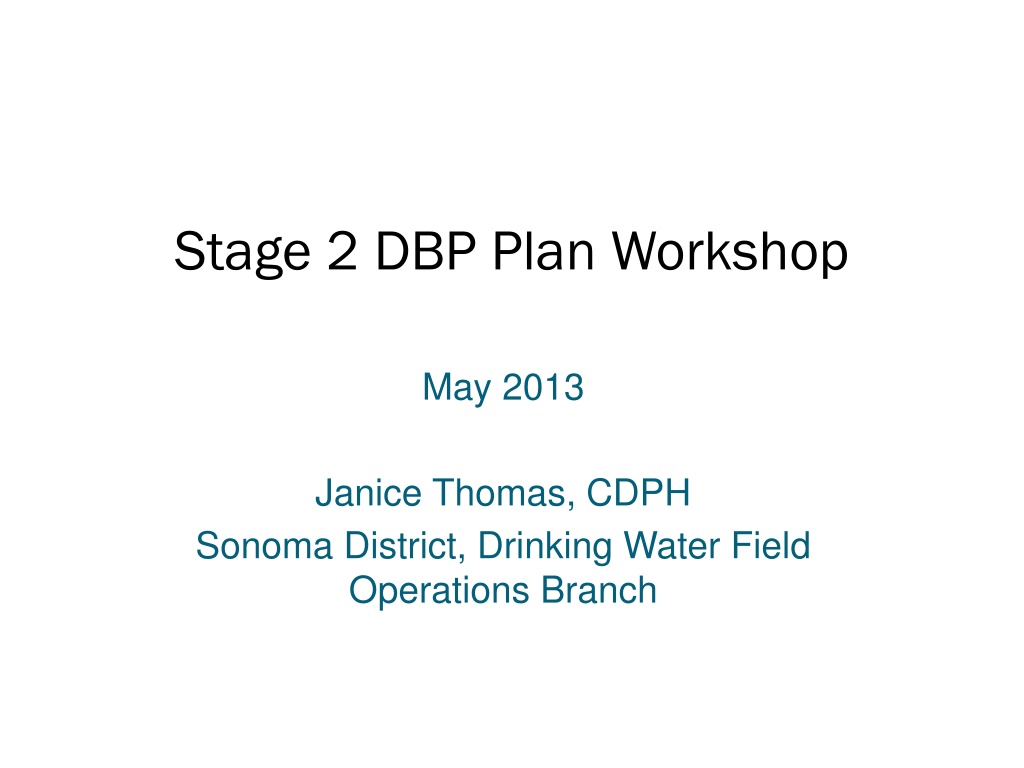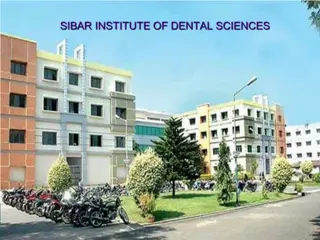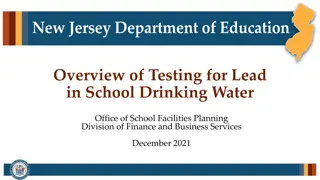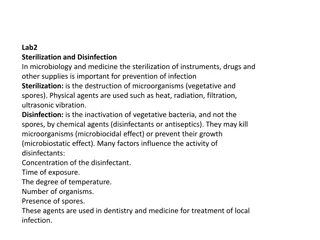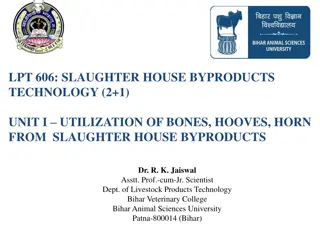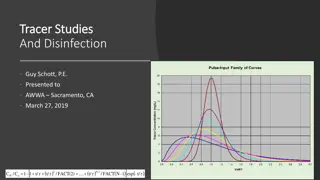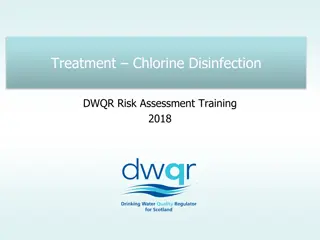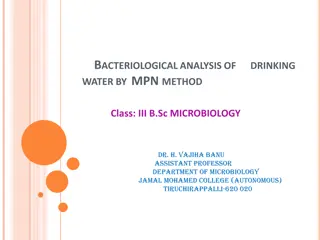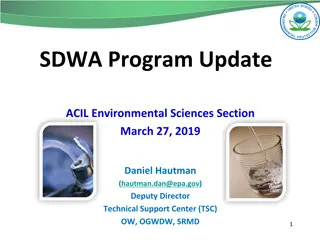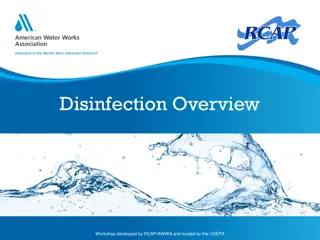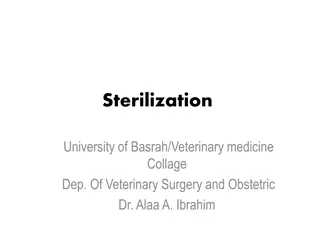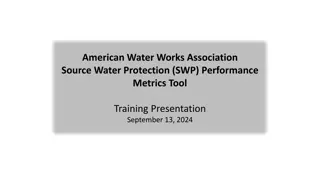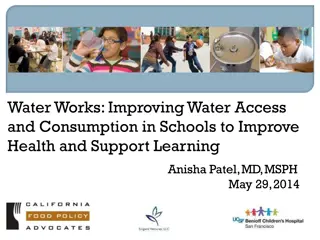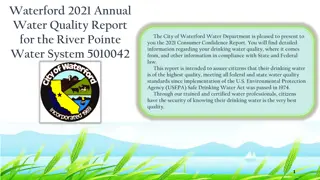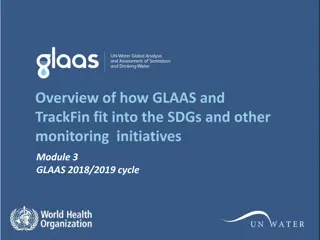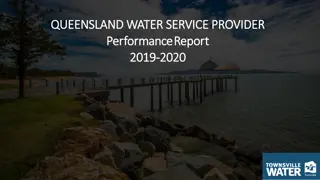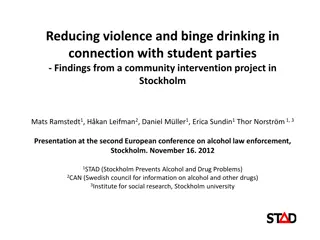Understanding Drinking Water Disinfection Byproducts Regulations
This content covers essential information about Stage 2 Disinfection Byproducts (DBP) regulations, including workshop schedules, reasons for plan redoing, acronyms, the purpose of DBP regulations, application to water systems, and carryover from Stage 1 DBP. It emphasizes the risks associated with disinfection byproducts and the importance of compliance for community water systems. The content provides clarity on monitoring frequencies, system classifications, and key terms related to drinking water safety.
Download Presentation

Please find below an Image/Link to download the presentation.
The content on the website is provided AS IS for your information and personal use only. It may not be sold, licensed, or shared on other websites without obtaining consent from the author. Download presentation by click this link. If you encounter any issues during the download, it is possible that the publisher has removed the file from their server.
E N D
Presentation Transcript
Stage 2 DBP Plan Workshop May 2013 Janice Thomas, CDPH Sonoma District, Drinking Water Field Operations Branch
Stage 2 Schedule Classification If your water system is one of these: Schedule Comply with Stage 2 DBP Rule by: C or NTNC, or part of large CDS which serves 100,000 or more people 1 April 1, 2012 C or NTNC, or part of large CDS which serves 50,000 to 99,999 people 2 October 1, 2012 C or NTNC, or part of large CDS which serves 10,000 to 49,999 people 3 October 1, 2013 C or NTNC serving less than 10,000 people and not connect to a larger system 4 October 1, 2013
Why redo the Plan? New monitoring frequencies Reminders OEL LRAA
ACRONYMS C Community (Water System) CDS Combined Distribution System CCR Consumer Confidence Report DBP Disinfection Byproducts DDBPR Disinfectants/Disinfection Byproduct Rule GWUDI Groundwater Under the Direct Influence (of Surface Water) HAA5 Haloacetic Acids Five IDSE Initial Distribution System Evaluation LRAA Locational Running Annual Average MCLs Maximum Contaminant Levels MRDL Maximum Residual Disinfectant Level NTNC Nontransient-noncommunity (Water System) OEL Operational Evaluation Level RAA Running Annual Average TOC Total Organic Carbon TTHM Total Trihalomethanes SW Surface Water
What is the purpose of the DDBPR? Disinfectants are used to kill disease-causing microorganisms in drinking water In excessive levels, disinfectants can cause negative health effects Disinfectants react with natural organic matter (NOM) in water, creating by-products Disinfection byproducts have been shown to cause cancer and adverse reproductive or developmental effects
To which systems does DBP apply? Community and Nontransient water systems Disinfects or delivers disinfected water Transient systems that use chlorine dioxide
What Carries over from Stage 1 DBP? MCLs Disinfection Byproducts MCL (mg/L) TTHM 0.080 HAA5 0.060 Bromate 0.010 Chlorite 1.0 MRDLs Disinfectants MRDL (mg/L) Chlorine 4.0 Chloramines 4.0 Chlorine Dioxide 0.8 Total Organic Carbon (TOC) monitoring (surface water systems)
Whats new in Stage 2 Monitoring Population Compliance based on - LRAA Compliance Schedule Combined Distribution System (CDS) and Schedule 1, 2, 3, & 4 IDSE Monitoring Frequency Routine, Reduced, Increased Operational Evaluation Level (OEL) Bromate reduced monitoring requirement Consumer Confidence Report
Locational Running Annual Average (LRAA) Stage 1 Total Average 4 = RAA Average Average Average Average Total 4 = LRAAPurple Total 4 = LRAAGreen Stage 2
What does it mean? 2 Duals 2 Duals or 1 Dual OR TTHM TTHM TTHM HAA5 TTHM TTHM HAA5 HAA5 HAA5 HAA5 2 Samples 2 Samples or 1 Dual OR TTHM TTHM TTHM HAA5 HAA5 HAA5
Stage 2 Routine Sampling Population SW/GWUDI 50,000 - 249,999 Sample # Frequency 8 Duals 4 Duals 2 Duals Quarter Quarter Quarter 10,000 - 49,999 3,301 - 9,999 500 - 3,300 2 Samples Quarter 2 Samples or 1 Dual 100,000 - 499,999 10,000 - 99,999 500 - 9,999 2 Samples < 500 Year GW 6 Duals 4 Duals 2 Duals Quarter Quarter Year < 500 Year or 1 Dual Return to routine from increased if TTHM LRAA 0.060 mg/L and LRAA HAA5 0.045 mg/L.
Stage 2 Reduced Sampling Population SW/GWUDI 50,000 - 249,999 Sample # Frequency 4 Duals 2 Duals 2 Duals 2 Samples or 1 Dual 2 Samples or 1 Dual 2 Duals 2 Duals 2 Samples or 1 Dual 2 Samples or 1 Dual Quarter Quarter Year 10,000 - 49,999 3,301 - 9,999 500 - 3,300 Year < 500 Year GW 100,000 - 499,999 10,000 - 99,999 Quarter Year 500 - 9,999 Year < 500 Three Year (GW: If LRAA 0.040 mg/L TTHM and 0.030 mg/L HAA5 and no sample >0.060 mg/L TTHM or >0.045 mg/L HAA5) (SW: Same as GW plus TOC annual average 4.0 mg/L)
Stage 2 Increased Sampling Population SW/GWUDI 50,000 - 249,999 10,000 - 49,999 Sample # Frequency 8 Duals 4 Duals 2 Duals 2 Duals 2 Duals or 1 Dual 6 Duals 4 Duals 2 Duals or 1 Dual 2 Duals or 1 Dual Quarter Quarter Quarter Quarter 3,301 - 9,999 500 - 3,300 < 500 Quarter GW 100,000 - 499,999 10,000 - 99,999 Quarter Quarter 500 - 9,999 Quarter < 500 Quarter If any sample > 0.080 mg/L TTHM or >0.060 mg/L HAA5
Can I stay on reduced? 0.040 mg/L TTHM LRAA AND 0.030 mg/L HAA5 LRAA Source water 4.0 mg/L TOC for SW/GWUDI Sampling sites do not change
Picking Sites Dual Equal number Fewer (Alternate between high TTHM and high HAA5 sites) More
When to sample Historical high month: Month and Location
When to start Quarterly start first quarter (Oct, Nov, or Dec 2013) Annual and Triennial Have 12 months to begin First start sampling Enter Month, Year, and Frequency Should capture Historical High Month
Operational Evaluation Level (OEL) Only applies if on quarterly AND routine or increased > 0.080 mg/L TTHM > 0.060 mg/L HAA5
Operational Evaluation Level (OEL) (continued) An early warning for a possible TTHM or HAA5 MCL violation Triggers a comprehensive review of system operations
Cx2 B A 2012 2013 2013 4
Some Examples of OEL Exceedances TTHM Data Stage 2 DBP Monitoring location October January April Operational Evaluation Value Location #1 0.070 mg/L 0.078 mg/L 0.082 mg/L 0.078 mg/L Location #2 0.072 mg/L 0.080 mg/L 0.086 mg/L 0.081 mg/L HAA5 Data Stage 2 DBP Monitoring location October January April Operational Evaluation Value Location #1 0.056 mg/L 0.060 mg/L 0.062 mg/L 0.060 mg/L Location #2 0.054 mg/L 0.062 mg/L 0.064 mg/L 0.061 mg/L
Operational Evaluation Level (OEL) (continued) If OEL exceedance occurs Need to conduct Operational Evaluation, including distribution, treatment, and source evaluations. If the cause(s) is known, request to limit your scope. 90 days to submit WCWWA.org for forms
How to Report Results Stage 2 DBP Reporting Form at WCWWA.org
More information at: WCWWA website http://wcwwa.memberlodge.com/CDPH Consumer Confidence Reports (CCRs) http://www.cdph.ca.gov/certlic/drinkingwater/Pages/CCR.aspx CDPH Recently Adopted Drinking Water Regulations Stage 2 DBP Rule http://www.cdph.ca.gov/certlic/drinkingwater/Pages/Regulations.aspx U.S. EPA Complying with the Stage 2 DBP Rule: Small Entity Compliance Guide http://www.epa.gov/ogwdw/disinfection/stage2/pdfs/guide_st2_stepguide_smallentit ycomplianceguide.pdf U.S. EPA Stage 2 DBP Rule Operational Evaluation Guidance Manual http://www.epa.gov/ogwdw/disinfection/stage2/pdfs/draft_guide_stage2_operationa levaluation.pdf
To complete your plan you will need: Form TTHM/HAA5 Data
ABC Mobile Home Park 4905555 # From Annual Reports
September Clubhouse Kitchen September 2014/Reduced
1 Dual 1 Dual per year 1 Dual every three years
DIST_CLUBHOUSE KITCHEN 4905555-006
California Department of Public Heath 50 D Street, Room 200 Santa Rosa, CA 95404 (707) 576-2145 Thank you!!
